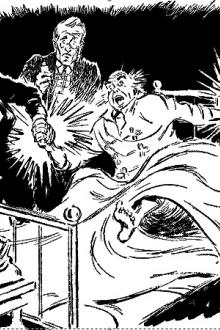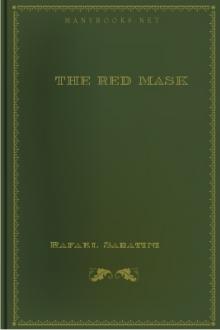The Face and the Mask - Robert Barr (comprehension books TXT) 📗

- Author: Robert Barr
Book online «The Face and the Mask - Robert Barr (comprehension books TXT) 📗». Author Robert Barr
That unfortunate slip of the tongue almost cost young Mr. Brown his life. He had been, thinking of the man under his own name, and the name had come out unconsciously. He did not even notice it himself in time to prepare, and the next instant the thief flung himself upon him and jammed his head against the iron rod that guided the rudder, with such a force that the rudder stayed in its place and the boat flew along the ice without a swerve.
"You scoundrel!" roared the bank-robber. "That's your game, is it? By the gods, I'll teach you a lesson in the detective business!"
Athlete as young Brown was, the suddenness of the attack, and the fact that Staples clutched both hands round his neck and had his knee on his breast, left him as powerless as an infant. Even then he did not realize what had caused the robber to guess his position.
"For God's sake, let me up!" gasped Brown. "We'll be into an air-hole and drowned in a moment."
"I'll risk it, you dog! till I've choked the breath out of your body." Brown wriggled his head away from the rudder iron, hoping that the boat would slew around, but it kept its course. He realized that if he was to save his life he would have to act promptly. He seemed to feel his tongue swell in his parched mouth. His strength was gone and his throat was in an iron vice. He struck out wildly with his feet and one fortunate kick sent the rudder almost at right angles.
Instantly the boat flashed around into the wind. Even if a man is prepared for such a thing, it takes all his nerve and strength to keep him on an iceboat. Staples was not prepared. He launched head first into space and slid for a long distance on the rough ice. Brown was also flung on the ice and lay for a moment gasping for breath. Then he gathered himself together, and slipping his hand under his coat, pulled out his revolver. He thought at first that Staples was shamming, but a closer examination of him showed that the fall on the ice had knocked him senseless.
There was only one thing that young Mr. Brown was very anxious to know. He wanted to know where the money was. He had played the part of private detective well in Toronto, after the very best French style, and had searched the room of Staples in his absence, but he knew the money was not there nor in his valise. He knew equally well that the funds were in some safe deposit establishment in the city, but where he could not find out. He had intended to work on Staples' fears of imprisonment when once he had him safe on the other side of the line. But now that the man was insensible, he argued that it was a good time to find whether or not he had a record of the place of deposit in his pocket-book. He found no such book in his pockets. In searching, however, he heard the rustling of paper apparently in the lining of his coat. Then he noticed how thickly it was padded. The next moment he had it ripped open, and a glance showed him that it was lined with bonds. Both coat and vest were padded in this way--the vest being filled with Bank of England notes, so the chances were that Staples had meditated a tour in Europe. The robber evidently put no trust in Safe Deposits nor banks. Brown flung the thief over on his face, after having unbuttoned coat and vest, doubled back his arms and pulled off these garments. His own, Brown next discarded, and with some difficulty got them on the fallen man and then put on the clothes of mammon.
"This is what I call rolling in wealth." said Brown to himself. He admitted that he felt decidedly better after the change of clothing, cold as it was.
Buttoning his own garments on the prostrate man, Brown put a flask of liquor to his lips and speedily revived him. Staples sat on the ice in a dazed manner, and passed his hand across his brow. In the cold gleam of the moonlight he saw the shining barrel of Brown's revolver "covering" him.
"It's all up, Mr. Staples. Get on board the iceboat."
"Where are you going to take me to?"
"I'll let you go when we come to the coast if you tell me where the money is."
"You know you are guilty of the crime of kidnapping," said Mr. Staples, apparently with the object of gaining time. "So you are in some danger of the law yourself."
"That is a question that can be discussed later on. You came voluntarily, don't forget that fact. Where's the money?"
"It is on deposit in the Bank of Commerce."
"Well, here's paper and a stylographic pen, if the ink isn't frozen-- no, it's all right--write a cheque quickly for the amount payable to bearer. Hurry up, or the ink will freeze."
There was a smile of satisfaction on the face of Staples as he wrote the check.
"There," he said, with a counterfeited sigh. "That is the amount."
The check was for 480,000 dollars.
When they came under the shadow of the American coast, Brown ordered his passenger off.
"You can easily reach land from here, and the walk will do you good. I'm going further up the lake."
When Staples was almost at the land he shouted through the clear night air: "Don't spend the money recklessly when you get it, Walker."
"I'll take care of it, Staples," shouted back young Brown.
* * * * *
Young Mr. Brown sprang lightly up the steps of the Temple mansion, Rochester, and pressed the electric button.
"Has Mr. Temple gone to the bank yet?" he asked the servant.
"No, sir; he is in the library."
"Thank you. Don't trouble. I know the way."
Mr. Temple looked around as the young man entered, and, seeing who it was, sprang to his feet with a look of painful expectancy on his face. "There's a little present for you," said Mr. Brown, placing a package on the table. "Four hundred and seventy-eight thousand: Bank of England notes and United States bonds." The old man grasped his hand, strove to speak, but said nothing.
* * * * *
People wondered why young Mr. and Mrs. Brown went to Toronto on their wedding tour in the depth of winter. It was so very unusual, don't you know.
THE SIXTH BENCH.
She was in earnest; he was not. When that state of things exists anything may happen. The occurrence may be commonplace, comic, or tragic, depending on the temperament and experience of the woman. In this instance the result was merely an appointment--which both of them kept.
Hector McLane came to Paris with noble resolutions, a theory of color, and a small allowance. Paris played havoc with all of these. He was engaged to a nice girl at home, who believed him destined to become a great painter; a delusion which McLane shared.
He entered with great zest into the life of a Parisian art student, but somehow the experience did not equal his anticipations. What he had read in books--poetry and prose--had thrown a halo around the Latin Quarter, and he was therefore disappointed in finding the halo missing. The romance was sordid and mercenary, and after a few months of it he yearned for something better.
In Paris you may have nearly everything--except the something better. It exists, of course, but it rarely falls in the way of the usually impecunious art student. Yet it happened that, as luck was not against the young man, he found it when he had abandoned the search for it.
McLane's theory was that art had become too sombre. The world was running overmuch after the subdued in color. He wanted to be able to paint things as they are, and was not to be deterred if his pictures were called gaudy. He obtained permission to set up his easel in the Church of Notre Dame, and in the dim light there, he endeavored to place on canvas some semblance of the splendor of color that came through the huge rose window high above him. He was discouraged to see how opaque the colors in the canvas were as compared with the translucent hues of the great window. As he leaned back with a sigh of defeat, his wandering eyes met, for one brief instant, something more beautiful than the stained glass, as the handiwork of God must always be more beautiful than the handiwork of man. The fleeting glimpse was of a melting pair of dark limpid eyes, which, meeting his, were instantly veiled, and then he had a longer view of the sweet face they belonged to. It was evident that the young girl had been admiring his work, which was more than he could hope to have the professor at Julien's do.
Lack of assurance was never considered, even by his dearest friend, to be among McLane's failings. He rose from his painting stool, bowed and asked her if she would not sit down for a moment; she could see the-- the--painting so much better. The girl did not answer, but turned a frightened look upon him, and fled under the wing of her kneeling duenna, who had not yet finished her devotions. It was evident that the prayers of the girl had been briefer than those of the old woman in whose charge she was. Where the need is greatest the prayer is often the shortest. McLane had one more transitory glimpse of those dark eyes as he held open the swinging door. The unconscious woman and the conscious girl passed out of the church.
This was how it began.
The painting of the colored window of Notre Dame now occupied almost all the time at the disposal of Hector McLane. No great work is ever accomplished without unwearied perseverance. It was remarkable that the realization of this truth came upon him just after he had definitely made up his mind to abandon the task. Before he allowed the swinging door to close he had resolved to pursue his study in color. It thus happened, incidentally, that he saw the young girl again, always at the same hour, and always with the same companion. Once he succeeded, unnoticed by the elder, in slipping a note into her hand, which he was pleased and flattered to see she retained and concealed. Another day he had the joy of having a few whispered words with her in the dim shadow of one of the gigantic pillars. After that, progress was comparatively easy.
Her name was Yvette, he learned, and he was amused to find with what expert dexterity a perfectly guileless and innocent little creature such as she was, managed to elude the vigilance of the aged and experienced woman who had her in charge. The stolen interviews usually took place in the little park behind Notre Dame. There they sat on the bench facing the fountain, or walked up and down on the crunching gravel under the trees. In the afternoons they walked in the secluded





Comments (0)